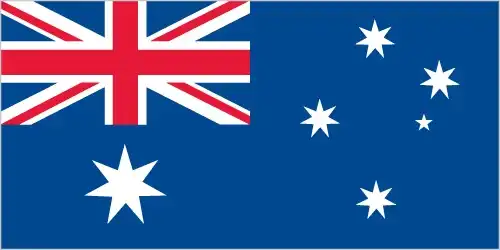Australia Flag
National Flag of Australia
Australia Flag Display

Quick Facts About Australia and Australia Flag
- Adopted:
- Aspect Ratio:
- 1:2
- Capital:
- Canberra
- Population:
- Approximately 26 million
Flag Description
A Blue Ensign featuring the Union Jack in the canton, a large seven-pointed Commonwealth Star beneath it, and the Southern Cross constellation on the fly side.
Symbolism & Meaning of the Australia Flag
Union Jack reflects historical ties to Britain; Commonwealth Star symbolizes the federation of six states and territories; Southern Cross denotes Australia’s geographic location.
Historical Background of the Australia Flag
Chosen from a public design competition following federation in 1901; officially approved by King Edward VII in 1903; proportions and emblem placements were legally standardized in 1908 and 1912.
Design Elements of the Australia Flag
Dark blue field with Union Jack in the canton; white seven-pointed star (six points for states, one for territories) beneath; five white stars representing Southern Cross on the fly side.
Usage & Protocol of the Australia Flag
Subject to the Australian Flags Code; flown on designated flag days and at government and public institutions with formal etiquette requirements.
Frequently Asked Questions
What do the colors of the Australia Flag represent?
Union Jack reflects historical ties to Britain; Commonwealth Star symbolizes the federation of six states and territories; Southern Cross denotes Australia’s geographic location.
When was the Australia Flag adopted?
The Australia flag was adopted on September 3, 1901 (design standardised in 1903), marking an important milestone in the country's development as an independent nation.
What is the aspect ratio of the Australia Flag?
The Australia flag has an aspect ratio of 1:2, which determines the proportional relationship between its width and height for official display purposes.